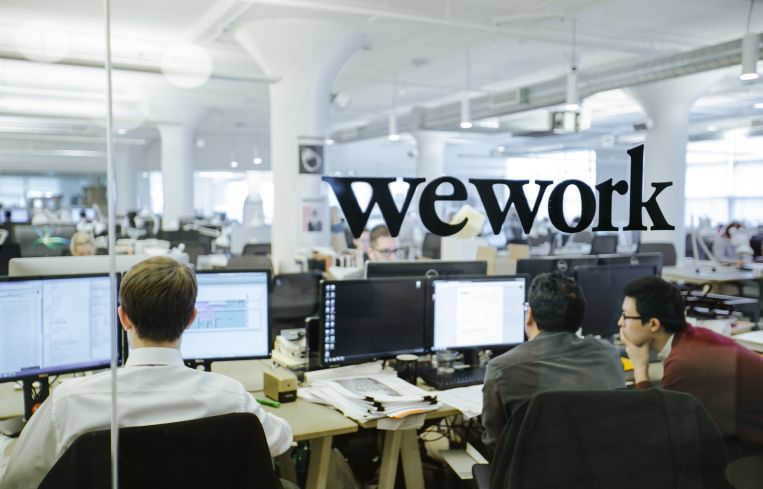How SoftBank’s Reduced Investment in WeWork Impacts Its IPO
The coworking company was expecting a $16 billion windfall from the Japanese bank, but only received $2 billion
By Nicholas Rizzi January 8, 2019 5:47 pm
reprints
Japanese bank SoftBank Group has cut its planned investment in coworking giant WeWork by only pumping another $2 billion into the company instead of the proposed $16 billion, WeWork announced today.
Combined with a previous $4 billion, Softbank has invested $6 billion in WeWork via its latest round of fundraising. WeWork—co-founded by Adam Neumann and Miguel McKelvey in 2010—plans to use $5 billion of that as growth capital and the other $1 billion to buy out shares from investors and employees, the company said. WeWork puts its pre-money valuation at $47 billion.
“WeWork has already experienced unparalleled growth and we are confident that with Adam’s vision and this growth capital the company will be able to aggressively pursue the enormous market opportunity ahead of them,” Masayoshi Son, the chairman and CEO of Softbank, said in a statement.
Experts and at least one competitor feel the smaller investment might make WeWork executives worry about the amount of money it loses each year and accelerate the company’s timeline for an initial public offering (IPO), which the full $16 billion funding could’ve pushed off for years.
“We know that WeWork is burning a lot of cash,” said Edward Shenderovich, the chairman and co-found of flexible workspace provider Knotel. “I guess it will bring more prudence to their financials.” He added that $2 billion was still a sizable investment for the company. “Maybe this is something that will accelerate their public offering,” Shenderovich said.
A spokeswoman for WeWork declined to comment about how the company’s plans have changed with the decreased investment. A spokesperson for SoftBank did not immediately respond to a request for comment.
In October 2018 news broke that SoftBank’s Vision Fund planned to take a majority stake in WeWork by investing $16 billion, with $10 billion to buy out existing shareholders and $6 billion for new capital, according to WSJ. But the publication reported last month that two key Vision Fund investors, the government-backed funds of Saudi Arabia and Abu Dhabi, had concerns about the deal because of the amount of money WeWork was hemorrhaging each year. In the first three quarters of 2018, WeWork lost $1.22 billion and generated $1.25 in revenue, Fast Company reported.
Unicorn companies, like WeWork and for-hire car service Uber, which are each valued at more than a billion dollars, try to stave off going public as long as possible because there’s “more intense scrutiny; it’s more red tape,” said Alex Snyder, a senior analyst with Philadelphia-based real estate investment manager CenterSquare.
Many in the Silicon Valley see any investment from SoftBank as a means to amass enough capital to stave off going public for as long as possible. However, for WeWork, Snyder said because the company is so big, the only way to continue its growth is to go public.
“There just aren’t that many people that can write that check,” Snyder said. “I’d be surprised if going public wasn’t at least somewhere in their minds as a potential capital source.”
SoftBank previously invested $8 billion to WeWork through its nearly $100 billion Vision Fund but the new money will come from SoftBank itself, according to Financial Times, which first reported news of the investment yesterday.
Aside from the $2 billion infusion, WeWork announced it will rebrand itself as The We Company and focus on three main pieces of its business: office space with WeWork, shared housing with WeLive and elementary schools with WeGrow.
“The We Company now touches approximately 5 million people around the world, with the funding to reach millions more,” Neumann said in a statement. “We’re driven by the impact we know we can have when we all work together with a shared intention.”
WeWork has been snapping up space all over Manhattan in recent years, inking one of its biggest deals in December 2018 with 236,000 square feet in CIM Group’s 1440 Broadway. It announced a couple of months prior that is has become the largest office tenant in the borough with a portfolio that was then 5.3 million square feet, The Real Deal reported.
Snyder said from what he’s seen WeWork could stop expanding right now and turn a profit and others in the field think some might be over exaggerating the negatives from WeWork’s latest round of investment.
“They are probably one of the most universally disliked startups of that magnitude,” said Daniel Doyon, the managing principal of San Francisco-based Workplace Hospitality Management, which negotiates real estate agreements between coworking tenants and landlords. “People always look for any reason to cast dispersion or throw shade at WeWork, but they still got a $2 billion cash infusion at a massive valuation from the most dominant venture capital private equity fund that ever existed.”



